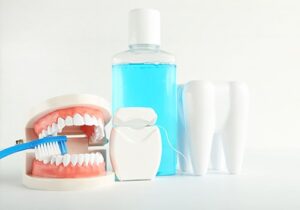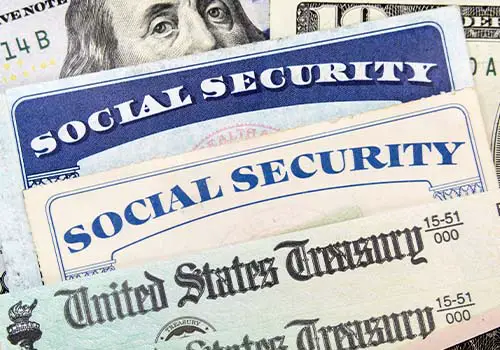You likely already know that millions of retirees rely on Medicare for health insurance. However, doctor visits and hospital stays aren’t the only things seniors might need.
Dental benefits are significant to most people, whether they get regular cleanings or have more involved dental needs. So, does Medicare provide dental coverage? What options are available for Medicare recipients to add dental coverage?
Keep reading as we give you all the details. We’ll tell you everything you need to know about getting dental services covered while receiving Medicare.
Does Medicare Cover Dental Care?
No. Original Medicare does not cover dental care. Medicare Part A and Part B provide hospital and health insurance, but they do not cover dental services.
So, what does Medicare cover? Part A covers most inpatient care and hospital stays, and Part B pays for doctor visits, preventive services, outpatient services, and lab tests.
- In some situations, Part A will pay for limited dental services received as part of your inpatient care in the hospital. This typically applies to emergency dental services related to an accident that is needed for your overall health.
- Medicare does not pay for standard services such as cleaning, fillings, dentures, or extractions.
Since Original Medicare coverage does not include dental insurance plans, Medicare recipients have a few options.
- First, they could pay out of pocket for any dental services they receive.
- They could also sign up for a Medicare Advantage plan with dental benefits.
- Lastly, they could purchase standalone dental insurance through a private insurance company.
Rest assured, this article will discuss each of these options in more detail, ensuring you are well-informed about the choices available to you.
KEY TAKEAWAYS
- Original Medicare does not cover dental care; however, if you have a medical emergency that impacts your teeth, it may cover part of the costs.
- Most Medicare Advantage plans have dental coverage that includes dental services, but there is usually a cap of $1,000 to $1,500 annually on how much they’ll pay.
- Typical dental insurance plans (including Medicare Advantage plans) cover routine cleanings at 100%, while other services require a copay of around 20% to 40% of the cost of the procedure.
Dental Coverage With Medicare Advantage Plans

Although Original Medicare does not provide dental coverage, many Medicare Advantage plans do provide benefits for dental services.
Remember that Medicare Advantage plans, or Medicare Part C, are administered and managed by private insurance companies. These plans must provide at least the same minimum level of coverage as Medicare, but they can also offer additional benefits.
- Many of these plans include dental insurance that covers a wide range of dental procedures. The cost and coverage details of these dental plans vary by provider since each provider is allowed to set its own rules.
If you decide to enroll in an Advantage plan covering dental care, carefully read the plan’s details. Coverage details will vary by plan, and you want to ensure your plan meets your needs.
- Some plans might cover dentures, while others do not. Some plans might cover basic cleanings at 100%, while others require a copayment. Different plans handle root canals, X-rays, routine dental care, and other procedures differently. Similarly, monthly premiums, copays, and coinsurance amounts will all vary.
Before you sign up for a Medicare Advantage plan, it’s crucial that you fully understand the plan’s details. Based on your unique situation and needs, you should be able to determine whether a particular plan is the right fit for you.
Must read articles related to Medicare
- Overview of what is covered under Medicare.
- If I need dentures, will they be covered by Medicare?
- Are dental implants covered by Medicare?
- Will Medicare pay for Life Alert?
- How do you sign up for Medicare?
Medicare Supplement Coverage Of Dental Services
Many people choose to enroll in Medicare supplement insurance, or Medigap, to help them cover out-of-pocket costs not covered by Medicare. So, does this mean that Medigap will pay for your dental care?
Unfortunately, Medicare supplement insurance does not provide dental benefits. Medigap pays for out-of-pocket expenses that Medicare does not cover, although it does not provide coverage beyond Medicare’s covered services.
So what this means is that the service must be covered by Medicare for Medigap to help pay for it.
- Medigap will help cover things like deductibles, coinsurance, and copays. For example, suppose you receive treatment in the hospital and are required to pay a $150 coinsurance amount. Although your Medicare plan covers much of the cost, you must still pay $150.
This could be a financial burden for many people. This is where Medigap comes into play. Your Medigap policy could help you pay for the $150 coinsurance amount not paid by the Medicare program.
Although private insurance companies manage Medigap policies, they are mostly standardized. Approximately ten plans are available, each with slightly different coverage details and costs.
As with most health plans, you should speak with a trusted insurance agent to help you choose the right plan for your situation.
Dental Coverage With Medicaid

Now that you know there are no Original Medicare dental benefits, what about oral health coverage for those on Medicaid? Remember the difference between Medicare and Medicaid?
- Medicare is a federal healthcare program for those who have paid Medicare taxes into the system.
- On the other hand, Medicaid is a joint federal and state program. It is designed to provide health care coverage for low-income individuals and families who cannot afford their coverage.
Dental coverage with Medicaid depends on a few factors. The first factor is age. For individuals under 21, Medicaid dental benefits are mandatory. This means the Medicaid program must provide dental coverage for these individuals as part of the EPSDT benefit program. This coverage must include regular dental screenings performed by a dentist and any services required to treat a condition identified during the screening. This could consist of tooth extractions, fillings, or other services.
For individuals over 21, Medicaid is not required to provide dental coverage. They might be required to pay for dental work on their own. Whether or not Medicaid offers dental coverage for those over 21 is decided by each state. Some states offer Medicaid enrollees dental coverage, while others do not. You should check with your state Medicaid office to determine whether you are eligible for dental benefits.
TIP
Medigap is not an excellent alternative for assistance with dental expenses since it only applies to medical expenses that qualify under Original Medicare. Medicare Advantage plans with dental coverage or standalone dental insurance are better options.
Other Dental Insurance Options For Seniors
What other options are available now that you know the details of dental insurance coverage for Medicare beneficiaries and Medicaid recipients? Remember that many Medicare beneficiaries choose to enroll in a Medicare Part D prescription drug plan since Medicare does not cover prescription drug costs.
Stand-Alone Dental Plan
Similarly, you may choose to enroll in a stand-alone dental plan to help cover the cost of dental services. Many insurance companies, like Cigna, Delta, and others, sell dental plans to Medicare enrollees. Each of these plans has different costs and coverage details.
You should always closely examine your options to ensure that you select the plan that is right for your situation. Your best option might be a Medicare Advantage plan that includes dental coverage.
Out of Pocket
You also have the option to pay for dental costs out of your pocket. Dental insurance is not required, so you do not have to buy dental coverage if you don’t need it. Perhaps you do not visit the dentist often or have other reasons for not needing dental insurance. In that case, your best option might be to go without coverage and pay for any expenses that might arise. Again, you can only make decisions based on your finances and health.
How To Enroll In Dental Coverage With Medicare
If you wish to enroll in dental coverage with Medicare, you have a couple of options. You may select a Medicare Advantage plan with dental coverage or enroll in a stand-alone dental plan.
If you choose a Medicare Advantage plan, you cannot just sign up anytime. If you still need to enroll in one of these plans, you must wait until the open enrollment period to sign up. Like group health insurance through your employer, the ability to sign up for coverage is limited to certain times of the year. You can also switch from Medigap coverage to a Medicare Advantage plan during this period.
If you decide to sign up for a stand-alone dental policy and keep Original Medicare, you should contact the plan administrator to determine how to enroll. Many of these plans also have open enrollment periods during which you can sign up for Medicare coverage.
Remember, you’re not alone in this process. A local insurance agent is there to guide you, help you find the right plans, and assist you with the enrollment process. Once you’re enrolled, you’ll receive an insurance card to use for your dental treatments.
The Bottom Line
Original Medicare does not provide dental benefits to its beneficiaries, and Medigap does not help pay for dental services.
However, these people have several options for obtaining dental benefits. The most common options are Medicare Advantage plans and standalone dental policies from private insurance companies.
It’s of utmost importance to carefully evaluate your individual circumstances to determine the most suitable dental benefits option for you. Some individuals may even choose to take full responsibility for their dental services, bypassing dental coverage altogether.
Frequently Asked Questions
First, remember that Original Medicare does not provide dental coverage for routine dental care.
In some situations, Part A might provide limited coverage for dental work required as part of overall health. This often occurs in the event of accidents or other conditions that require emergency dental services.
Even though dental coverage is not provided through Original Medicare, many Medicare Advantage plans include dental coverage. These plans are managed by private insurance companies, and the coverage details vary by plan.
The price for dental coverage varies depending on the specific plan selected. Some Medicare Advantage plans offer no monthly premium and include dental coverage.
However, most dental insurance plans require a monthly premium of between $20 and $50. In addition to the premium, other costs associated with dental treatment, such as copays, deductibles, and coinsurance, also exist.
You must enroll in a Medicare Advantage plan to get dental coverage through Medicare.
This can be done when you first become eligible for Medicare or during an open enrollment period. Remember that Original Medicare does not provide dental coverage, so an Advantage plan is the only way to get dental coverage with Medicare.
Browse some of the best Medicare Advantage plans available and select the one that best fits your needs. To sign up, contact the insurance company that administers the plan. You will begin paying the monthly premium (if there is one), and your coverage will begin.
Remember from the overview of Medicare early in this article that dental services are not covered under Original Medicare.
In some cases, Medicare may provide limited coverage for dental services that are medically necessary for one’s overall health. This is sometimes the case during accidents or emergencies when dental care is immediately required.
While Medicare does not cover routine dental care, like cleanings, fillings, or other services, there is hope. Some Medicare Advantage plans do cover these services, providing you with additional options for your dental care needs.
You can find a Social Security Administration office near you by using our SSA office locator and searching for your closest location.





